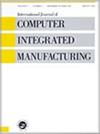Evaluation of the reconfigurability of manufacturing systems based on fuzzy logic taking into account the links between the characteristics of the RMS
IF 4
3区 工程技术
Q2 COMPUTER SCIENCE, INTERDISCIPLINARY APPLICATIONS
International Journal of Computer Integrated Manufacturing
Pub Date : 2023-09-19
DOI:10.1080/0951192x.2023.2257632
引用次数: 0
Abstract
ABSTRACTToday, faced with the global COVID-19 crisis, manufacturing systems are subject to constraints caused by an uncertain and changing environment dominated by strong international competition. In this context, many indicators have been proposed to evaluate the responsiveness and flexibility of production systems. The literature review shows that some research streams have received positive attention from the research community, these streams include RMS characteristics analysis, RMS performance analysis and applied research and field applications, while other streams such as the reconfigurability level assessment and reconfigurability towards Industry 4.0, still need further research. This paper shows the need for more rigorous analytical measures to assess the level of reconfigurability, as there are still no accurate and quantitative RMS reconfigurability indices. There is a need for successful case studies detailing best practices to effectively guide the transition of modern industrial enterprises towards reconfigurable manufacturing. This paper proposes, a decision support tool to help manufacturers evaluate reconfigurability according to its characteristics (modularity, scalability, integrability, convertibility, diagnosability and customization) using fuzzy logic.KEYWORDS: Reconfigurable manufacturing system (RMS)decision-makingfuzzy logicDEMATELMAUT Disclosure statementNo potential conflict of interest was reported by the author(s).Availability of data and materialThe authors confirm that the data and material supporting the findings of this work are available within the article. The raw data that support the findings of this study are available from the corresponding author, upon a reasonable request.Ethical approvalThe authors declare compliance with ethical standards.Additional informationFundingThis research did not receive any specific grant from funding agencies in the public, commercial, or not-for-profit sectors.基于模糊逻辑的制造系统可重构性评价,考虑了RMS特性之间的联系
【摘要】面对全球新冠肺炎危机的今天,制造系统受到了由激烈的国际竞争主导的不确定和不断变化的环境所带来的约束。在这方面,提出了许多指标来评价生产系统的反应能力和灵活性。文献综述表明,RMS特性分析、RMS性能分析以及应用研究和现场应用等研究方向得到了学术界的积极关注,而面向工业4.0的可重构性水平评估和可重构性等研究方向仍有待进一步研究。由于目前还没有准确定量的均方根可重构性指标,因此需要更严格的分析方法来评估均方根可重构性水平。有必要进行成功的案例研究,详细说明最佳做法,以有效地指导现代工业企业向可重构制造过渡。本文提出了一种基于模糊逻辑的决策支持工具,帮助制造商根据可重构性的模块化、可扩展性、可积性、可转换性、可诊断性和可定制性等特征对可重构性进行评估。关键词:可重构制造系统(RMS)决策模糊逻辑dematelaut披露声明作者未报告潜在利益冲突。数据和材料的可获得性作者确认,在文章中可以获得支持本研究结果的数据和材料。支持本研究结果的原始数据可在合理要求下从通讯作者处获得。伦理批准作者声明符合伦理标准。本研究没有从公共、商业或非营利部门的资助机构获得任何特定的资助。
本文章由计算机程序翻译,如有差异,请以英文原文为准。
求助全文
约1分钟内获得全文
求助全文
来源期刊
CiteScore
9.00
自引率
9.80%
发文量
73
审稿时长
10 months
期刊介绍:
International Journal of Computer Integrated Manufacturing (IJCIM) reports new research in theory and applications of computer integrated manufacturing. The scope spans mechanical and manufacturing engineering, software and computer engineering as well as automation and control engineering with a particular focus on today’s data driven manufacturing. Terms such as industry 4.0, intelligent manufacturing, digital manufacturing and cyber-physical manufacturing systems are now used to identify the area of knowledge that IJCIM has supported and shaped in its history of more than 30 years.
IJCIM continues to grow and has become a key forum for academics and industrial researchers to exchange information and ideas. In response to this interest, IJCIM is now published monthly, enabling the editors to target topical special issues; topics as diverse as digital twins, transdisciplinary engineering, cloud manufacturing, deep learning for manufacturing, service-oriented architectures, dematerialized manufacturing systems, wireless manufacturing and digital enterprise technologies to name a few.

 求助内容:
求助内容: 应助结果提醒方式:
应助结果提醒方式:


